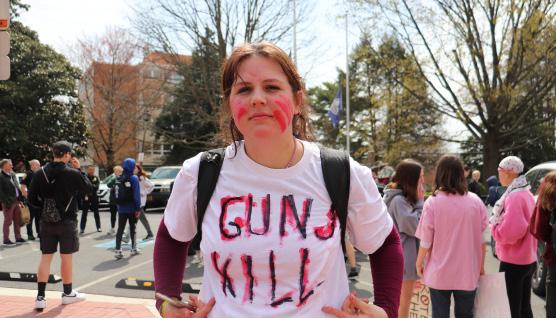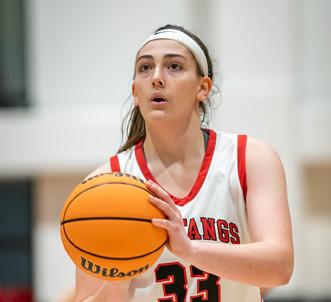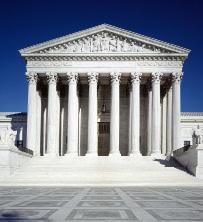
5 minute read
Raising Voices for Change

Meridian Students Speak Out
Advertisement
Kaylah Curley

It seems like every day there is a new headline in the news that channels frustration throughout the entire Meridian student body.
From the civil rights movement to the anti-war protests of the 1960s and 70s, student activism has been a driving force for community and global change. Fast forward to the present day, same school, different name, students continue to fight for change.
Over the past school year, whether individually or through an organized event, students around



Meridian have taken part in all different types of activism, from strikes, protests, to walkouts and more. One atribute they have in common is that they call for change.
Regardless of ones’ stance on the issue in question, student voices are fundamental to our society today. Students around the United States have organized to demand change, sending clear messages to those in power.
Fighting for change within and around our community has built solidarity among students. Meridian students have created a sense of shared purpose and build networks to further their goals. This desire for change has inspired students like senior Elijah Pelton, who has been a prevalent member of the Meridian Students Demand Action club, among various other advocacy groups.
Most recently, Pelton, along with the Meridian Gun Prevention club, was involved in organizing the school strike that took place on March 31. “We are not scared to fight for change to secure regulations on gun control. Students and teachers deserve to feel safe in their classrooms,” the club said. Over 180 students from both Mary Ellen Henderson and Meridian partici- pated in the strike.
Student activism continues to be a potent force for change. With the rise of social media and mass communication, student groups around the community organize efficiently and effectively to address issues that matter to them. Whether it’s fighting for environmental justice, advocating for marginalized communities, or pushing for firearm control, student activists lead the charge to instill change.
Student led groups and clubs have created a centralized entrepot for passion and opportunity. “Don’t be afraid to speak your mind. Don’t be afraid to get yelled at,” Pelton said. “Pick a topic you know about, whether through previous research or life experience … Here at MHS, there are so many clubs and organizations, you can definitely find something that you are passionate about.”
By thinking globally and acting locally, Meridian students are doing their part to make the community a better and safer place.
“If you start with change in your city, state, or county, someone else WILL notice.”

The Lasso Meridian High School
121 Mustang Alley, Falls Church, VA 22043
703-248-5500 www.meridianlasso.org
Mission Statement: The Lasso and its staff strive to inform their readers through accurate and factual reports, where information has been thoroughly gathered and verified; serve as an educational laboratory experience for those on staff; be accurate, fair, and impartial in its coverage of issues that affect the school community; not avoid publishing a story solely on the basis of possible dissent or controversy; cover the total school population as effectively and accurately as possible; report all issues in a legal, objective, accurate and ethical manner, in accordance with the Canons of Professional Journalism developed by the Society for Professional Journalists.
Editor-in-Chief
Stella Turner
Managing Editors
Clara Kasik
Isabel Costa
Public Relations Editor
Elizabeth Creed
News Editors
Kaylah Curley
Sophia Borghesani
Features Editors
Abby Crespin
Molly Moore
Opinions Editor
Preston Lieu
Staff Writers & Contributors
Sofia Braverman
Tessa Dunn
Anna Goldenberg
Rachel Grooms
Sasha Kasher
Tessa Kassoff
Madison Keelen
Victor Kidwell
Elbetel Kiros
Sara Meade
Kylie Moffatt
Ben Mossburg
Cailyn Murphy
Amity Pratt
Mara Statie
Vedika Thapliya
Arianna Vargas
The Class of 2023 has been a high achieving bunch since the start. Although small in comparison to other classes, our impact has been monumental. From our show-stopping leads in plays and musicals to our six college sports commits, our students excel at all of their passions. As the group responsible for building GIVE Day up from a small TJ club to a service organization that stretches across the entire school system with hundreds of members, this class has no lack of dedication.
The Class of 2023 has endured a multitude of transition periods and name changes since elementary school. We’ve escaped the bars on the windows in the TJ trailers, endured fires and floods in the MEH gym and survived everything about the old GMHS. As the last grade to ever attend school in the old GM building, we have developed a level of appreciation for each of the schools we have passed through. We are the liaison between the peeling floors and rotting ceiling tiles in George Mason and the pristine hallways and monumental staircases of Meridian.
Across starkly different buildings, our grade has shown respect for the facilities we have been so fortunate to call home. These unique experiences and the memories of our times together have only served to unite our small class throughout our entire K-12 experience.
There is no doubt that this is a group that will be successful. Our class is full of passion and dedication and has a willingness to pursue that which does not come easily, including the grueling battle for our senior privileges. The legacy of the Class of 2023 reflects memories from the past and the promises of the future.
By Preston Lieu
Affirmative action.
A controversial piece of legislation that has dictated millions of student’s college admissions and has found itself in the hands of the Supreme Court. Many expect the conservative majority to strike down the practice when they decide the case in June.

Also known as positive action, affirmative action seeks to reverse historical trends of discrimination among minority groups, creating an environmentwhere equal employment opportunity can prevail. The term was initiated by President Lyndon Johnson, who wanted to improve opportunities for African Americans to combat discriminatory policies in the 1960s.
However, the turning point took place after the assassination of Dr. Martin Lurther King Jr. in 1968, with students pushing colleges to be more represen- tative of American society. Harvard was the first college to act, announcing a commitment to enroll a substantially higher percentage of Black students
The Supreme Court will hold a decision on the constitutionality of affirmative action in midJune, with many expecting the legislation to be overturned given the Supreme Court’s conservative majority. (Photo courtesy of Raw Pixel)
“As a Hispano-German student, I’m both prodiversity and equality. In the affirmative action conversation, it’s important to discern equality and equity, and with the college admissions game, I believe income plays a larger role than race. I’ve been blessed with various opportunities throughout my life and it’s ultimately those opportunities that got me either admitted or waitlisted to the majority of the schools I applied to,” senior John Hanson Doebel said.
“It is complicated, but I definitely support affirmative action. I don’t think it should just apply to someone because they are a minority however. I think when a person has had to overcome certain circumstances like race, socioeconomic status, gender, or simply lack certain educational opportunities that everyone else has access to, they should be given deeper consideration. I think the possible overturning of affirmative action is disappointing. Maybe affirma- tive action isn’t fair, but it’s also a step to fixing the past and continuous systemic racism, discrimination, and poverty in the United States,” senior Zoe Clement said. than in the past, less than four weeks after Dr. King’s death.

Since then, the majority of colleges have incorporated affirmative action policies in their admissions process to increase diversity among their students and give every applicant equal opportunity to education and employment.
For some, affirmative action acts as a vital tool to provide all Americans with equal opportunity. For others, affirmative action is unconstitutional legislation that reinforces pernicious stereotypes and harms certain minority groups.
In light of the potential overturning of affirmative action in the next month, The Lasso sought out senior opinions on the hotlycontested topic and the decision that will be held in June.







